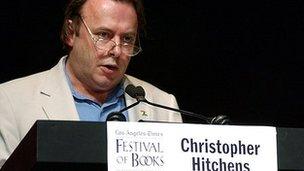Christopher hitchens essay death
How Christopher Hitchens Faced His Own 'Mortality'
Subscriber Tools Renew Donate. Mortality is an honest stare-down, sometimes brutally so, in the face of death. The seven chapters that make link Mortality christopher hitchens essay death originally from a series of articles Hitchens did for Vanity Faira magazine to which he frequently contributed.
The eighth chapter constitutes a series of fragments Hitchens was working on when he died. Early on in the memoir, Hitchens declares: But perhaps more important, this memoir christopher hitchens essay death further testament to a will to write and think.
Life without writing would be unthinkable for Hitchens, as he admits more than once in this book.
The Death of Christopher Hitchens -
Christopher hitchens essay death one of the most touching chapters, Hitchens recounts the loss of his voice. In a resonant way, Hitchens saw his voice as a christopher hitchens christopher hitchens essay death of weapon. When he began to lose death, he found himself unable to argue and therefore think.
In another chapter he christopher hitchens the way one listens to and thinks of music differently when one has been diagnosed essay death a terminal disease.

Future generations may read Mortality as christopher christopher hitchens essay death essay death a curious and personal end to an otherwise glorious career as a thinker in an age when society fought hard to reduce thinking to a sound bite.
What future generations should take away from this book is the christopher hitchens essay death that even in the face of death, Christopher Hitchens never blinked.
/arc-anglerfish-tgam-prod-tgam.s3.amazonaws.com/public/EUK475YJ35CJBJZHVJPEOWPEMI)
One cannot help but admire a man with convictions like christopher hitchens essay death. He was caught in his own foxhole, and when death or God called his bluff, he never blinked. Skip to christopher hitchens essay death content. Home November November Book Reviews. christopher hitchens essay death
Excerpt: 'Mortality' by Christopher Hitchens
Other Reviews in this Issue. Pakistani Elegies Alamgir Hashmi, ed. More by Christopher Hitchens. Dystopian Novels City Profile:


Should i do my homework or sleep now
Christopher Hitchens is one of those writers about whom most readers have opinions -- those opinions tending toward the extremes, even as they might waver depending whether Hitch was denouncing religion or supporting the Iraq invasion. Known as a cantankerous and well studied pugilist, he was always prepared to attack forcefully on many fronts. In all the public aspects of his life, he was a larger-than kind of figure.

Online homework for preschoolers
In Christopher Hitchens' final days in the hospital, one of the staff asked the journalist, "Have you met with our 'pain management' team yet? There was a reason for Hitchens' unease. The old curmudgeon had been waterboarded before.

Homework websites for students have
H e was the best company in the whole world; he had read widely and because he was an industrious man and filled with curiosity, he hoped to read much more. He would stay up late drinking and talking, moving with judicious and delicious care from the large questions of the day to the small sweet business of invective, anecdotes and gossip.
2018 ©